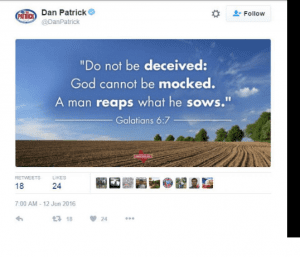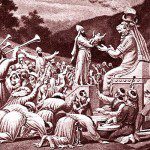Dear Thoughtful Pastor: Can you tell me the background for Dan Patrick’s tweet?

This verse comes from the New International Version (NIV) translation of the Greek Bible. The NIV is a male-centric interpretative translation so I am going to turn to the more accurately inclusive New Revised Standard Version where the verse reads: “Do not be deceived; God is not mocked, for you reap whatever you sow.”
Background material: The letter to the church at Galatia was probably the earliest written of the books in the Christian Bible, sent to a group of early Jesus-followers in what is now modern-day Turkey.
It is apparent that these people were on the verge of leaving their new-found faith. Paul, the author of the letter, begins by defending himself and his right to tell them about Jesus. He reminds them that he had been a former persecutor of those who were following Jesus but has been endorsed now by Peter, one of the face-to-face disciples of Jesus.
One of the hallmarks of Paul’s influence on the development of Christian thought is that he fought vigorously for the idea that men who were coming to acknowledge Jesus as Messiah did not have to undergo circumcision to mark their entrance into the life of faith. Instead, baptism became the entry point.
Paul, with this strong affirmation, became the self-declared Apostle to the Gentiles, taking words of grace to those formerly excluded from the covenant God made with Abraham.
Two things are important here: One, those early Jesus-followers acknowledged that their religious beliefs had their entire base in Judaism. Two, by making baptism, not circumcision, the mark of entrance into the community of faith, it became open to all.
This argument ultimately leads to Paul’s most powerful statement, found in Galatians 3:28: “There is no longer Jew or Greek, there is no longer slave or free, there is no longer male and female; for all of you are one in Christ Jesus.”
Much of the letter castigates those folks in the Galatian church for wanting to return to a religion based, as they understood it, on rules and regulations, on one that is fleshly based and exclusive (circumcision, reserved for the few), rather than stay the course with a Spirit-based and inclusive (baptism, open to all) religion.
The book camps on the idea of freedom: that we were once slaves to sin, but have now been set free, no longer slaves, but children, even heirs, of God. The call then, to those early Jesus followers as well as to us today: “How shall we use that freedom?”
Paul makes that perfectly clear that the only thing that counts is faith working through love (Gal. 5:6). He reminds these struggling believers that, “the whole law is summed up in a single commandment, ‘You shall love your neighbor as yourself.’ “(Gal.5:14).
He lists the things that keep us from loving, things that include enmities and strife, jealousy and anger, quarrels and dissension, factions and envy, lack of self-control over sexuality and appetite.
A paragraph before the now infamous Patrick-tweeted verse, Paul states it clearly. These are the things that we are called to live from: love, joy, peace, patience, kindness, generosity, faithfulness, gentleness, and self-control.
Readers will find no equivocation in this statement: “Let us not be conceited, competing against one another, envying one another” (Gal. 5:26).
So what does it mean that God is not mocked? That we reap what we sow? Well, frankly, Dan Patrick exhibited it perfectly in his ill-timed tweet that appeared to say that those who were mercilessly slaughtered at a gay nightclub by a self-avowed ISIS adherent got what they deserved.
By so putting it out there, even accidentally, Patrick reaped what he has sown. He has displayed enormous disgust and intolerance toward the GLBTQI community. He has indicated that his is the religion of the flesh and of law, not of Spirit and grace
Knowing his stances, his Twitter followers connected the tweet with the tragedy, leading to giant cyberspace outrage at what appeared to be Patrick’s delight in the multiple murders.
This whole episode also highlights the serious problem of yanking Bible verses out of context and hanging them out there as if they are magic potions.
I remember when I was first venturing into the proof-texting world. My father, a church goer but with little real knowledge of the Bible, expressed concern. He said, “This what I know about the Bible: ‘Judas went and hanged himself. Go and do likewise. Whatever thou doest, do quickly.’”
Now, those are three different Bible verses, yanked out of context, and put into one statement. Ridiculous? Yes, but no more so than anyone who creates memes with isolated Bible verses.

[Note: a version of this column is scheduled to run in the June 16, 2016 edition of the Denton Record Chronicle. The Thoughtful Pastor, AKA Christy Thomas, welcomes all questions for the column. Although the questioner will not be identified, I do need a name and verifiable contact information in case the newspaper editor has need of it. Please email questions to: [email protected].]













